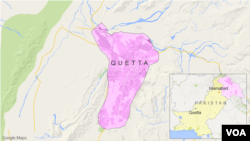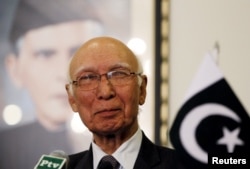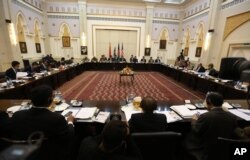Authorities in Pakistan say security forces have arrested 14 suspected militants linked to the Afghan Taliban in the southwestern city of Quetta.
The detainees are being questioned and more information will be shared with media, but it is not known if high-profile (Taliban) leaders are among them, security officials told VOA Thursday on condition of anonymity.
The officials said law enforcement agencies, acting on a tip, picked up the men from the city’s eastern Pashtoonabad area, which houses mostly Afghan refugees.
“We have also seized important maps and documents about sensitive places and installations in the province,” they added, without sharing more details.
Government officials did not immediately comment on the arrests in Quetta.
Peace talk delays
PeacePakistan was supposed to host peace talks between Taliban and Afghan government officials in the first week of March, but, in a last-minute announcement, the insurgent group refused to attend the meeting, citing certain pre-conditions.
Earlier, Foreign Ministry spokesman Mohammad Nafees Zakaria, at his weekly news conference in Islamabad, reiterated Pakistan's commitment to promoting the Afghan peace efforts.
“It has been our consistent position that a political negotiated settlement is the most viable option for bringing lasting peace to Afghanistan. We will continue to play our positive role in this regard,” he said
The Taliban leadership is believed to be sheltering and directing the Afghan insurgency from areas in and around Quetta, the capital of Balochistan province, which shares a border with Afghanistan.
For years, Pakistan rejected Afghan and U.S. assertions that Taliban insurgents are using Pakistani soil for their insurgent activities.
Taliban leaders in Pakistan
Last week, Prime Minister Nawaz Sharif's adviser on foreign affairs Sartaj Aziz, for the first time, publicly admitted that Taliban leaders are present in Pakistan and that leverage can be used to push them to the negotiating table for talks with the Afghan government.
“We have some influence on them because their leadership is in Pakistan, and they get some medical facilities; their families are here. So we can use those levers to pressurize them to say, 'Come to the table,'” Aziz said at the Council on Foreign Relations in Washington.
Afghan officials say Pakistan has assured a four-nation contact group, which includes China and the United States, that Islamabad will take action against Taliban insurgents on its soil who oppose political reconciliation with Kabul and want to continue with their violent campaign in Afghanistan.














